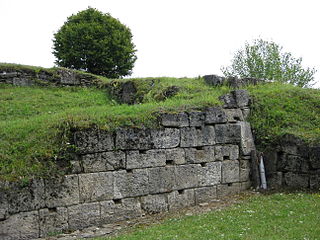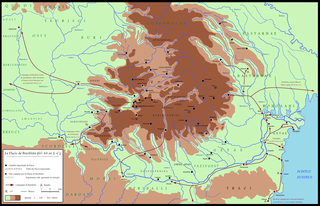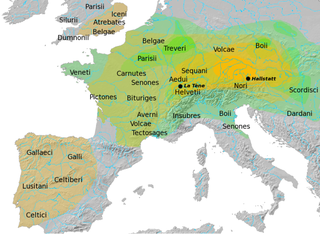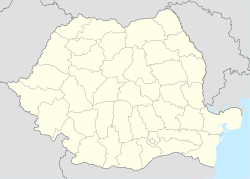
Dacia was the land inhabited by the Dacians. The Greeks referred to them as the Getae and the Romans called them Daci.

Bistrița-Năsăud is a county (județ) of Romania, in Transylvania, with the capital city at Bistrița.

Dacian is an extinct language, generally believed to be Indo-European, that was spoken in the Carpathian region in antiquity. In the 1st century, it was probably the predominant language of the ancient regions of Dacia and Moesia and possibly of some surrounding regions. The language was probably extinct by the 7th century AD.

Murus Dacicus is a construction method for defensive walls and fortifications developed in ancient Dacia sometime before the Roman conquest. It is a mix between traditional construction methods particular to Dacian builders and methods imported from Greek and Roman architecture and masonry, and – although somewhat similar construction techniques were used before, during and long after the period – it has peculiarities that make it unique.

Protochronism is a Romanian term describing the tendency to ascribe, largely relying on questionable data and subjective interpretation, an idealized past to the country as a whole. While particularly prevalent during the regime of Nicolae Ceaușescu, its origin in Romanian scholarship dates back more than a century.

Vasile Sebastian Dîncu is a Romanian politician who served as Deputy Prime Minister and Minister of Regional Development and Public Administration in the cabinet of Prime Minister Dacian Cioloș. Although the Cioloș cabinet was non-partisan, he is a member of the Social Democratic Party and the Party of European Socialists. He was a Member of the European Parliament in 2007 with the accession of Romania to the European Union and a member of the Senate of Romania.

The Someșul Mare is a river in north-western Romania, originating in the Bistrița-Năsăud County in the Rodna Mountains at the confluence of two headwaters — the Preluci and the Zmeu. The Someșul Mare flows west through Rodna, Năsăud and Beclean, until it meets the Someșul Mic upstream of Dej. Its length is 130 km (81 mi) and its basin size is 5,033 km2 (1,943 sq mi). Downstream from its confluence with the Someșul Mic, the river is called Someș.

Șieu is a commune in Bistrița-Năsăud County, Transylvania, Romania. It is composed of four villages: Ardan, Posmuș, Șieu and Șoimuș.

Săcel is a commune in Maramureș County, Maramureș, Romania. Composed of a single village, Săcel, it is the last locality up the Iza Valley. From here one can get to the Vișeu Valley through Dealul Moiseiului Pass and to Transylvania through Dealul Ștefāniței Pass, which separates the Țibleș and Rodna Mountains.

Dacian Julien Cioloș is a Romanian agronomist who was Prime Minister of Romania between November 2015 and January 2017. In the Călin Popescu-Tăriceanu cabinet, he was Agriculture Minister from October 2007 to December 2008. In November 2009, European Commission President José Manuel Barroso nominated him to be the next Agriculture Commissioner, a post he assumed in February 2010 and held until his term expired in November 2014. In November 2015, President Klaus Iohannis named him Prime Minister, and Cioloș assumed office after receiving approval from Parliament. He remained until after the 2016 parliamentary election, which was lost by the parties that called for Cioloș to continue his term. Cioloș is the founder and current leader of the Freedom, Unity and Solidarity Party. In May 2019, he was elected a Member of the European Parliament, subsequently becoming leader of the new Renew Europe political group.
Dacology is a branch of Thracology which focuses on the scientific study of Dacia and Dacian antiquities and is a regional and thematic branch of the larger disciplines of ancient history and archaeology. A practitioner of the discipline is a Dacologist. Dacology investigates the range of ancient Dacian culture from c. 1000 BC up to the end of Roman rule in the 4th-7th centuries. It is directly subordinated to Thracology, since Dacians are considered a branch of the Thracians by most mainstream research and historical sources. Other theories sustain that the Daco-Thracian relation is not as strong as originally thought and as such Dacology has the potential to evolve as an independent discipline from Thracology.

Dava is a Geto-Dacian name for a city, town or fortress. Generally, the name indicated a tribal center or an important settlement, usually fortified. Some of the Dacian settlements and the fortresses employed the Murus Dacicus traditional construction technique.

The appearance of Celts in Transylvania can be traced to the later La Tène period . Excavation of the great La Tène necropolis at Apahida, Cluj County, by S. Kovacs at the turn of the 20th century revealed the first evidence of Celtic culture in Romania. The 3rd–2nd century BC site is remarkable for its cremation burials and chiefly wheel-made funeral vessels.

The National Register of Historic Monuments is the official English name of the Romania government's list of National Heritage Sites known as Monumente istorice. In Romania, these include sites, buildings, structures, and objects considered worthy of preservation due to the importance of their Romanian cultural heritage. The list, created in 2004, contains places that have been designated by the Ministry of Culture and National Patrimony of Romania and are maintained by the Romanian National Institute of Historical Monuments, as being of national historic significance.

The Party of Liberty, Unity and Solidarity is a pro-European, centrist political party established on October 26, 2018, whose president is Dacian Cioloş, former prime minister of Romania, elected on January 26, 2019. The party has its origin in the Movement Romania Together, a project to which they gave up due to the setting up delay in court.
The 2019–20 Liga IV Bistrița-Năsăud was the 52nd season of Liga IV Bistrița-Năsăud, the fourth tier of the Romanian football league system. The season is scheduled began on 31 August 2019 and was scheduled to end in June 2020, but was suspended in March because of the COVID-19 pandemic in Romania.
The season was abandoned and no teams was declared county champion.















